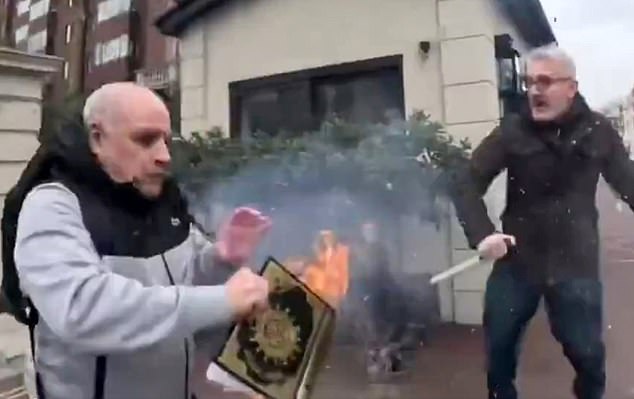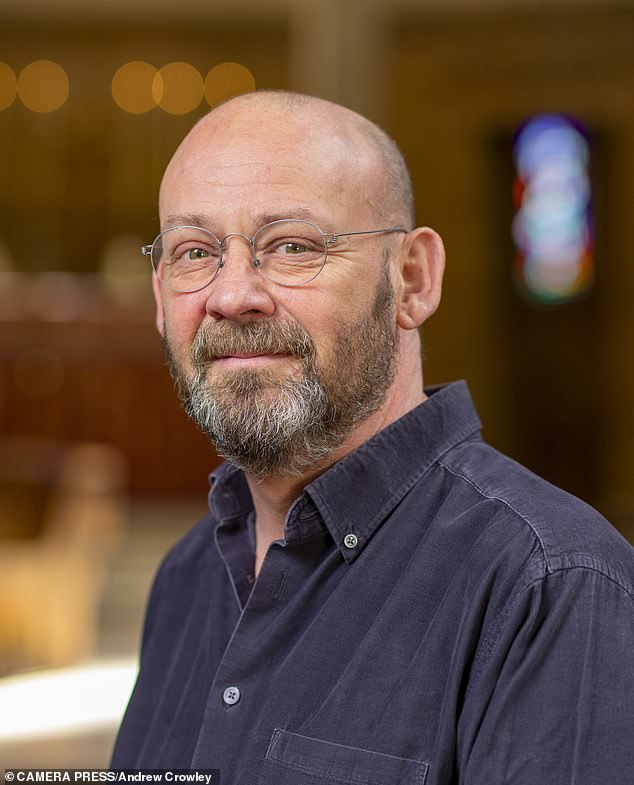Growing up in my native Pakistan, I came to the conclusion that Islam was discriminatory and misogynistic. It was a religion that had been weaponised to keep independent-thinking women like me, and anyone who opposes the fundamentalists, in their place by fear.
I’d watched, appalled, at news footage of people being lynched in the street or burned alive for raising the questions about Islam I had privately asked myself.
As Pakistan became more and more radicalised, this slowly became a routine occurrence rather than a one-off event.
Those who joined the mob were never prosecuted, despite posting movie clips or selfies of themselves at the scene of the crimes on social media.
Even those dissidents who escaped mob ‘justice’ would be sent to prison on trumped-up blasphemy charges and left to rot because no lawyer would take on their cases.
The lawyers, too, were frightened they might be killed, just as I felt too frightened to express my doubts about Islam even to my closest friends. You never knew who you could trust.
The day I realised there was no longer a place for me in my own country – that it was time to leave, before it was too late – I’d been working as a journalist in the religiously conservative city of Lahore.
It was January 2011, and the Governor of Punjab, Salman Taseer, had been gunned down by a member of his own personal protection team who objected to the fact that Taseer had appealed for clemency for a Christian woman, Asia Bibi, who had been sentenced to death for blasphemy following a petty argument.

Hamit Coskun burns a copy of the Koran outside the Turkish consulate in Knightsbridge, London, on February 13
His murderer, Mumtaz Qadri, was eventually hanged for the crime but was hailed a hero by hard-line religious groups, leaving me feeling frightened and sick.
So you can imagine the huge sense of relief and liberation I felt when I came to Britain, a country where my right to ask questions, to harbour doubts, to reject the religion I was born into and to speak openly were guaranteed by what I thought was one of the core principles of Western liberal democracy: the right to free speech.
But now I see that even here, the right to be a religious dissident is under threat.
Inch-by-inch, community leaders, clerics at local mosques and Labour MPs with an eye on keeping the votes of Muslim constituents are manoeuvring to reintroduce a criminal offence of blasphemy – a law that was abolished in 2008.
And this threat to the British way of life is being deliberately ignored by liberals under the guise of opposing Islamophobia and endorsing their own ‘politically correct’ form of multiculturalism. They prefer to overlook the fact that only Islam is pressing for the return of the blasphemy law.
In effect, it is radical Muslims who want to introduce a law against insulting Islam – with the aim of silencing those who oppose them and their views.
Even knowing all this, I still felt uncomfortable when I saw pictures of Hamit Coskun burning a copy of the Koran outside the Turkish consulate in Knightsbridge, London on February 13.
I don’t approve of burning books, whatever their content. I would far rather debate the issues they contain.
But it’s important to understand the context behind Coskun’s actions. He is a Turkish Kurd who despairs at the steady takeover of his country by Islamist extremists who persecute anyone who doesn’t share their fundamentalist, closed-minded views.
In court he said he was imprisoned and tortured for seven years in Turkey for his involvement with a banned political party.
His actions made a political point and were designed to ensure his protest made headlines around the world – as is his right in a Western democratic society.
And when I posted about his case on social media and expressed my unease about the act of book-burning, Coskun made a considered and polite reply. ‘You say that you do not approve of burning the Koran, I respect your opinion,’ he wrote. ‘However, my country is evolving towards the Sharia system.
‘Years ago, I was also against tearing and burning the Koran. But later I realised that we need to respond in a way that Islamists can understand.’
While I still cannot say I approve of burning books, I can absolutely defend his right to protest. It’s important to note that nobody was harmed by it.
Coskun didn’t even insult Islam: the target of his anger was the Turkish government. That’s why I was appalled to learn that he had been arrested and charged with a religiously aggravated public order offence, and that the case was deemed so serious he appeared at Westminster Magistrates’ Court earlier this week.
Where is his right to free speech? Where are those supposed safeguards of Western liberal democracy? And why, when blasphemy is not illegal in this country, did his case come anywhere near a courtroom? That’s why I feel this prosecution – whatever the outcome – has set a dangerous precedent.
It gives credence and legal weight to those who want Islam to have protected status in British law, and is a continuation of the radical Islamists’ attack on Western freedom of expression.
It pushes forward a phenomenon that began with the pronouncement of a fatwa in 1989 calling for the death of Indian author Salman Rushdie because of his novel The Satanic Verses.
The phenomenon continued with death threats against cartoonists who have the temerity to sketch the prophet Mohammed, and led to a deadly terror attack on the Parisian offices of the satirical magazine Charlie Hebdo, which ran such cartoons.
District Judge John McGarva will deliver his verdict tomorrow.

Growing up in her native Pakistan, KHADIJA KHAN came to believe that Islam was discriminatory and misogynistic
If Coskun is convicted, it will introduce into case law the idea that the Koran is protected like no other book – not even the Bible.
Furthermore, it will put a target on the back of anyone who speaks out against Islam in any way.
It would be bad for religious dissenters, atheists and even ordinary observant British Muslims, who will effectively be held hostage by religious extremists even more than they are already.
But beyond that, it would see freedoms native Britons have long taken for granted – the freedom to mock religion, to question it or to argue an intellectual case against it – disappear in the blink of an eye.
Khadija Khan is politics and culture editor at A Further Inquiry magazine.
REV GILES FRASER: So now the defenders of free speech side with book burners… who for centuries have silenced heretics
I have a pile of old, dog-eared Bibles on my desk at church. Some have lost multiple pages, some are a bit mouldy. The print is tiny and many have lost their jackets. Ultimately, they are of no practical use.
But I can’t bring myself to put them in the recycling bin. They are too precious to throw away. For generations, people have cried over them, let their hopes be carried by them, read from them while their loved ones were dying.
They are invested with a huge amount of emotional energy.
Holy books, like flags and children’s toys, have a kind of soul. They mean a lot more than paper and print.
You may not agree. You may even want to make a point about not agreeing. Fair enough. But burning books – particularly in the name of free speech – is demented.
It is, in fact, the ultimate act of censorship – the very opposite of free speech.
Take the Nazis, who set alight Torah scrolls and other works considered ‘un-German’. In May 1933, groups of young men gathered huge piles of ‘unacceptable’ literature and torched them to cinders in the public square of towns and cities, gathering around the flames to give the Nazi salute.
Alongside Hebrew Bibles, they burnt works by German novelist Thomas Mann, US author Ernest Hemingway and German poet Heinrich Heine.

Holy books, like flags and children’s toys, have a kind of soul, writes REV GILES FRASER
Over a century before, Heine himself had famously warned: ‘Where they burn books, they will also ultimately burn people.’ His prediction was coming true.
It wasn’t just the Nazis – examples exist throughout history. The Roman emperor Diocletian burnt Christian books. The Catholic Church in the 13th century burnt every book it could find relating to the Cathars of Languedoc, a Christian sect that posed a threat to its authority.
Henry IV burnt books by the rebellious Lollards to stamp out their ‘heretic’ opinions, and also ordered those captured to be burnt at the stake.
Muslims have burnt texts by Buddhists, and they burnt Salman Rushdie’s novel, The Satanic Verses, because they didn’t like what it said about the Prophet.
Even my precious Bibles contain an account of book burnings by the early Christians: ‘A number of those who practised magic collected their books and burnt them publicly.’ (Acts 19.19)
History tells us, over and over again, that book burning is akin to oppression. Then, in February, Turkish-born Hamit Coskun burnt a copy of the Koran in front of the Turkish consulate in London.
Yet, charged with a public order offence, his defending barrister is arguing in court that ‘to render such an act a criminal offence is tantamount to introducing a blasphemy law’ and that ‘his protest… requires the highest protection of freedom of speech’.
Coskun’s legal fees are also, notably, being paid by the National Secular Society and the Free Speech Union.
When the defenders of free speech are now siding with the very people who have, for centuries, tried to silence heretics and those with views deemed unacceptable, it is not free speech at all – it is the most ridiculous inversion of it.
Surely the Free Speech Union has picked the wrong side?
This is, of course, very far from siding with the prosecution and wanting the introduction of what some argue would be a blasphemy law.
I want people to be able to have their say, even if I don’t like it and am offended by it.

Hamit Coskun leaves Westminster Magistrates’ Court in February, where he was charged with intent to cause harassment, alarm or distress against the religious institution of Islam
Personally, I want to protect the dissidents and the heretics, the strange and the different, the offensive and the politically incorrect. My being offended is not a good enough reason to close down debate. That is what it is to live in an open and tolerant society.
And that’s what makes it crazy that the Free Speech Union is now siding with the most intolerant of mullahs and authoritarian regimes throughout history.
The National Secular Society may not like the Koran, and they have every right to say so, but to support its burning puts them in the company of the very people whose narrow world views they purport to oppose.
In a free and secular society like ours, books are the very repositories of free speech. You can write what you like; you can tell me that my views are foolish. From comics to Bibles, from novels to newspapers, the word is the life blood of the free society.
In response to those who burnt The Satanic Verses, Rushdie wrote one of the most moving defences of literature ever published. Indeed, Is Nothing Sacred? is a much better work of literature than the rather turgid Satanic Verses itself.
In it he acknowledges that, before the whole controversy over his novel, he would have said that nothing is sacred – that the sacred is a deeply conservative notion that shuts down free conversation.
But the book burning changed his mind. ‘Now, however, I find my entire world-picture under fire,’ he wrote. ‘And as I find myself obliged to defend the assumptions and processes of literature, which I had believed that all free men and women could take for granted, and for which all unfree men and women continue every day to struggle, so I am obliged to ask myself questions I admit to finding somewhat unnerving. Do I, perhaps, find something sacred after all?’
In a secular age, Rushdie argues, literature itself is sacred.
This is different to arguing that burning books should be illegal. Something can be profoundly wrong without being illegal.
And indeed, there are laws against inciting hatred that exist to protect the religious and the non-religious alike.
But it’s worth acknowledging just how true it is that literature is the heart and soul of a free society. And those who burn books are its enemies.










